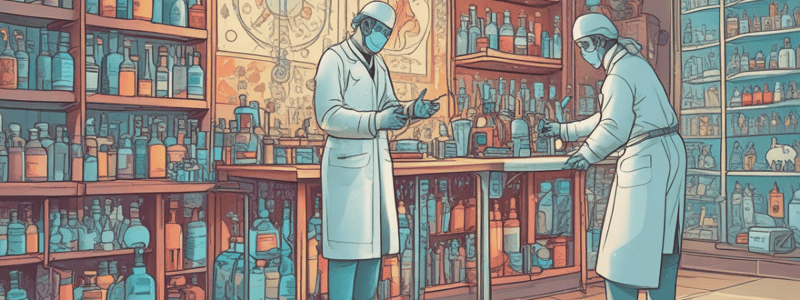Podcast
Questions and Answers
What is the primary goal of stimulating mucosal immunity in vaccination?
What is the primary goal of stimulating mucosal immunity in vaccination?
- To provide systemic immunity against pathogens
- To prevent infection at the point of entry of the infectious agent (correct)
- To reduce the virulence of the pathogen
- To develop memory immune responses against infectious agents
What type of vaccine is developed by culturing the virus on human cells and then successively on cells of a different species?
What type of vaccine is developed by culturing the virus on human cells and then successively on cells of a different species?
- Inactivated vaccine
- Conjugate vaccine
- Subunit vaccine
- Live attenuated vaccine (correct)
What is the characteristic that makes whole cell vaccines more potent?
What is the characteristic that makes whole cell vaccines more potent?
- Use of viral vectors
- Ability to elicit cytotoxic T cells (correct)
- Killing of microorganisms with chemicals
- Ability to stimulate mucosal immunity
What is the purpose of attenuation in vaccine development?
What is the purpose of attenuation in vaccine development?
What type of vaccine uses killed microorganisms that are treated with chemicals or heat?
What type of vaccine uses killed microorganisms that are treated with chemicals or heat?
What is the advantage of live attenuated polio vaccines?
What is the advantage of live attenuated polio vaccines?
What type of vaccines are developed as a result of understanding that a single isolated constituent of a microorganism cannot activate an immune response?
What type of vaccines are developed as a result of understanding that a single isolated constituent of a microorganism cannot activate an immune response?
Which type of vaccine is synthesized in the lab using recombinant DNA technology?
Which type of vaccine is synthesized in the lab using recombinant DNA technology?
What is the purpose of linking poorly immunogenic bacterial polysaccharides to proteins?
What is the purpose of linking poorly immunogenic bacterial polysaccharides to proteins?
What type of vaccine is made from inactivated toxic compounds that cause illness?
What type of vaccine is made from inactivated toxic compounds that cause illness?
Which bacteria have conjugate vaccines developed against them?
Which bacteria have conjugate vaccines developed against them?
What is a key advantage of subunit or recombinant vaccines compared to whole organism vaccines?
What is a key advantage of subunit or recombinant vaccines compared to whole organism vaccines?
Why may a single constituent vaccine not be fully effective?
Why may a single constituent vaccine not be fully effective?
What is a common way to enhance the immunogenicity of bacterial polysaccharides?
What is a common way to enhance the immunogenicity of bacterial polysaccharides?
Why are adjuvants often added to conjugate vaccines?
Why are adjuvants often added to conjugate vaccines?
What type of vaccines may overcome the limitation of not triggering a cytotoxic T cell response?
What type of vaccines may overcome the limitation of not triggering a cytotoxic T cell response?
What is the primary reason repeated doses of a vaccine may be required?
What is the primary reason repeated doses of a vaccine may be required?
What type of vaccine is made from inactivated toxic compounds that cause diseases such as tetanus and diphtheria?
What type of vaccine is made from inactivated toxic compounds that cause diseases such as tetanus and diphtheria?
What is the purpose of using viral vectors in vaccine development?
What is the purpose of using viral vectors in vaccine development?
What type of vaccine is the Haemophilus influenza type B vaccine?
What type of vaccine is the Haemophilus influenza type B vaccine?
What is the advantage of using mRNA vaccines?
What is the advantage of using mRNA vaccines?
What is the mechanism of action of self-amplifying RNAs in vaccines?
What is the mechanism of action of self-amplifying RNAs in vaccines?
What is the type of vaccine that was developed against Bordetella pertussis?
What is the type of vaccine that was developed against Bordetella pertussis?
What is a consequence of the segmented nature of the influenza virus genome?
What is a consequence of the segmented nature of the influenza virus genome?
Why are new flu vaccines released every year?
Why are new flu vaccines released every year?
What is a goal of vaccination?
What is a goal of vaccination?
What is a mechanism underlying the rapid evolution of influenza viruses?
What is a mechanism underlying the rapid evolution of influenza viruses?
What is the result of the exchange of RNA segments between mammalian and avian influenza viruses?
What is the result of the exchange of RNA segments between mammalian and avian influenza viruses?
What is the progressive increase in antibody affinity with repeated stimulation of B cells related to?
What is the progressive increase in antibody affinity with repeated stimulation of B cells related to?
Flashcards are hidden until you start studying
Study Notes
Vaccination Goals and Immune Response
- Vaccination aims to trigger humoral adaptive immune responses, leading to long-lived plasma and memory cells.
- Multiple rounds of immunization are recommended to enhance antibody affinity and ensure protective immunity.
Annual Flu Vaccination
- New flu vaccines are released yearly due to the rapid evolution of flu viruses.
Genome Reassortment
- Genome reassortment between mammalian and avian influenza can result in pandemic strains, such as the 2009 H1N1.
- The segmented genome of influenza allows genetic exchange, increasing diversity and contributing to quick viral evolution.
Importance of Mucosal Immunity
- Effective vaccination should stimulate mucosal immunity, particularly for pathogens entering the body through mucosal surfaces.
- Vaccines can be administered orally or by nasal inhalation to achieve this goal, exemplified by live attenuated polio vaccines.
Types of Vaccines
- Live Attenuated Vaccines: Microorganisms treated to reduce virulence (e.g., BCG, polio).
- Inactivated Vaccines: Pathogens killed through chemicals or heat (e.g., polio).
- Subunit Vaccines: Composed of purified components or toxoids (e.g., tetanus, diphtheria).
- Recombinant Protein Vaccines: Created using recombinant DNA technology (e.g., Hepatitis virus).
- Conjugate Vaccines: Link bacterial polysaccharides to protein carriers to enhance immune response.
Vaccine Activation and Immunogenicity
- Effective vaccines often require more than one component to activate various immune cell types.
- Many vaccines need adjuvants to enhance immunogenicity.
- Live attenuated vaccines can elicit a cytotoxic T cell response, unlike most other types.
Valence of Vaccines
- Monovalent: Targets a single antigen or microorganism.
- Multivalent: Designed to immunize against multiple strains or microorganisms (e.g., DTaP vaccine).
Revaccination Necessity
- Repeated doses are sometimes necessary due to inadequate initial immune stimulation or waning immunity.
Vaccination Against Intracellular Microbes
- Developing vaccines for intracellular microbes is challenging; however, several strategies are utilized:
- Viral Vectors: Incorporate microbial antigen genes into viruses, producing antigens within host cells.
- Bacterial Plasmids: DNA encoding antigens is ingested by antigen-presenting cells.
- mRNA Vaccines: Engineered to mirror naturally occurring mature mRNA, stimulating antigen production in host cells.
Safety and Efficacy of Vaccines
- Killed whole bacterial cell vaccines (e.g., for whooping cough) can cause side effects, while live attenuated types may lead to complications in some cases.
- Studies revealed that four components of Bordetella pertussis induce sufficient immune response through acellular vaccines.
Studying That Suits You
Use AI to generate personalized quizzes and flashcards to suit your learning preferences.




